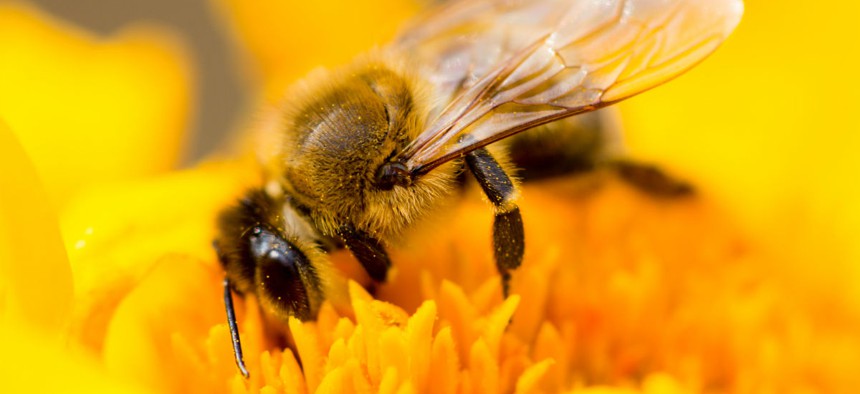
Lostry7 / Shutterstock.com
The White House Has A Plan to Save America's Dying Honeybees
Strategy will change the way government gardens and grounds are landscaped.
President Obama wants to save the bees.
America's honeybees are dying off in droves. And on Tuesday, the White House unveiled a blueprint that it hopes will help the imperiled species.
The ambitious agenda aims to dramatically cut down on honeybee-colony loss over the next decade and grow the population of monarch butterflies while restoring roughly 7 million acres of land over the next five years that can serve as pollinator habitats.
To achieve that goal, the administration plans to devote extra dollars to honeybee research, put the use of pesticides under a microscope, call for changes to the way government gardens and grounds are landscaped, and educate the public about the importance of protecting honeybees and butterflies.
The Washington Post first reported the release of the report on Tuesday.
At stake is the fate of a species that adds as much as $15 billion worth of value to agricultural yields each year. Pollination made possibly by honeybees is essential to the survival of crops such as apples, almonds, cherries, and avocados.
Commercial beekeepers in the United States began reporting a loss of nearly one-third of their hives during the winter of 2006. And the problem isn't going away. Honeybee die-offs soared during the past year, according to data released by the Agriculture Department earlier this month. Monarch-butterfly populations have also been hard hit, experiencing declines in recent years.
Scientists say the trend is alarming alarming. Pesticides, parasites, poor nutrition, and genetics are most often cited as likely causes of honeybee decline.
But environmentalists say that pesticides are the leading factor behind the insect epidemic. A five-year scientific review of the academic literature released last summer concluded that pollinators are "highly vulnerable" to a kind of pesticide known as neonicotinoids often blamed for bee deaths.
Chemical companies that manufacture the pesticides, including Bayer and Syngenta, have pushed back against that claim, saying that the chemicals are safe.
The Environmental Protection Agency moved to restrict the use of the pesticides this spring, declaring that no new uses would be approved until the agency completes a review of the chemicals. But green groups criticized the agency action, saying that it fell far short of what's needed to save the bees by failing to take any pesticides currently in use off the market.
The White House is also asking Congress for additional money to carry out the plan. The administration wants to spend $82.5 million on research and other initiatives aimed at helping honeybees.
(Image via Lostry7 / Shutterstock.com)







